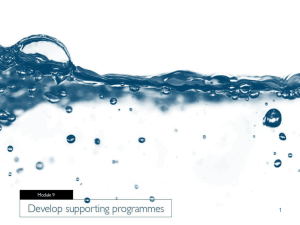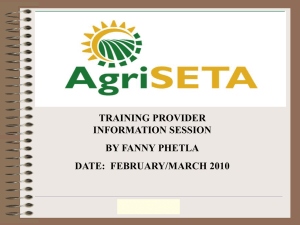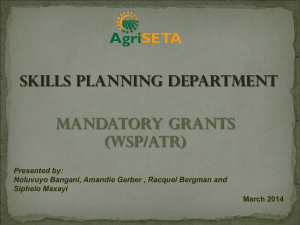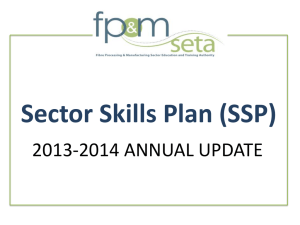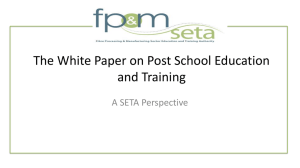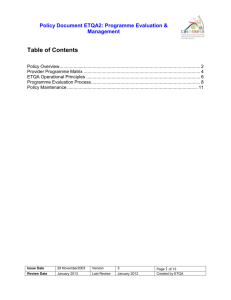- Sasseta
advertisement
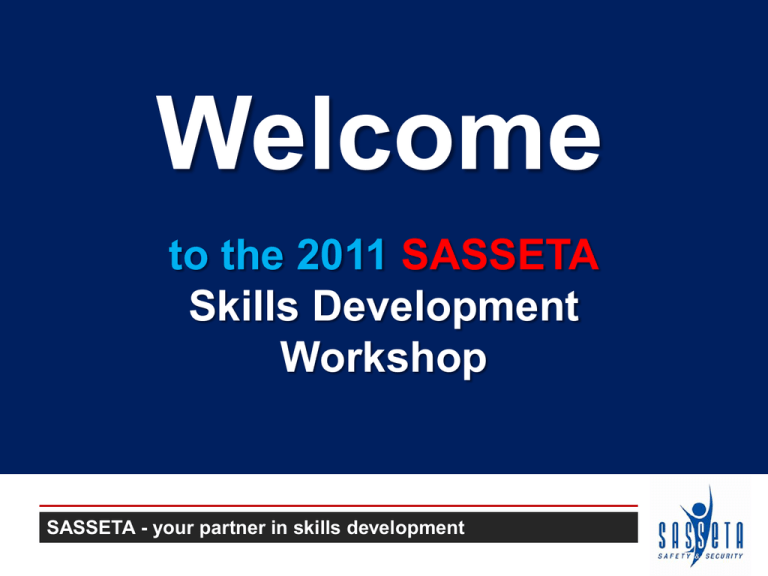
Welcome to the 2011 SASSETA Skills Development Workshop SASSETA - your partner in skills development sassetasdfworkshop2011 Welcome Zongezile Baloyi Chief Executive Officer SASSETA - your partner in skills development Workshop content New skills development landscape SSP overview Learning Programmes Coffee Discretionary Grants Accreditation processes Mandatory Grants Electronic filing demo Conclusion and Closure Lunch sassetaSDFworkshop2011 sassetasdfworkshop2011 New Skills Development Landscape Zongezile Baloyi Chief Executive Officer SASSETA - your partner in skills development New skills development landscape A Political dispensation New political dispensation for skills development and training Cabinet to transfer this from DOL to DHET Integration of Education and Training Dedicated Ministry for Higher Education & Training Creation of a single post schooling system sassetaSDFworkshop2011 New skills development landscape A new SETA landcape Minister announced new Landscape on 03/11/10 Re-certified for period April 2011 – March 2016 Transfer to SASSETA of Metro Police and Traffic Enforcement SASSETA scope (Policing, Defence, Intelligence, Corrections, Legal, Private Security, Justice, Metro Police and Traffic enforcement) sassetaSDFworkshop2011 New SETA landscape and recertification process Factors considered by the minister when evaluating SETA certificate renewal Overall SETA performance over past 5 years SETA Annual Reports SETA Audited Financial Statements Effective Governance Stakeholder input sassetaSDFworkshop2011 Launch of new NSDS III Launched 13 January 2011 Links to national HR development strategy Built on the pillars of the Sector Skills Plan Offers new growth path Establishes solid base for skills development planning Access to foundational / occupational programmes Institutional partnership sassetaSDFworkshop2011 NSDS III significant changes to dispensation Reduction of Mandatory grant to 40% Linking of new PIVOTAL grant to Mandatory Grant and now employers can claim back more than the previous 50% Introduction of a Code of Decent Conduct Expand learning programmes beyond learnerships Focus on public sector delivery partners Introduction of Catalytic Grants sassetaSDFworkshop2011 Governance Maximum size of SETA Board - 15 members Three ministerial appointees (Independent Chairperson, Community Rep. and Professional body rep) Ministerial approval for 12 nominated Board Members Maximum of 4 Board meetings per annum Remuneration of members to align with 76(2) and 4 of PFMA New Boards effective 1 April 2011 sassetaSDFworkshop2011 Quality Council for QCTO Quality Council for the Trade and Occupations is a new body created in recent SDA amendments Exists among 3QC’s (Umalusi, CHE & QCTO) Facilitate development of demand driven occupational learning system Manage and co-ordinate qualification in the Occupational Qualifications framework QCTO confers delegations to SETA ETQA’s with powers to qualify existing primary focus qualifications SETA’s will continue ETQA function until QCTO withdraw the delegations sassetaSDFworkshop2011 Questions? sassetaSDFworkshop2011 sassetasdfworkshop2011 Sector Skills Plan Wilson Sangweni Senior Practitioner Skills Administration SASSETA - your partner in skills development Profile of the sector Sic Code Chamber Description Employees 9110A Policing SAPS / ICD 186, 000 9110B Corrections DCS 41, 907 9110C Justice DoJCD 18,181 9110D Defence DoD 74,596 88110 Legal Legal / Sheriffing 59, 313 88920 Priv. Security Gen. Security 387,544 Safety and Security Value Chain Crime Prevention Judicial & Legal Defence Intelligence Crime Combating Private security Policing Society Corrections / rehabilitation Society sassetaSDFworkshop2011 Society Skills Demand Cross cutting top 3 priority skills ICT (Information & Communication Technology) Numeracy & Literacy Leadership & Management sassetaSDFworkshop2011 Skills demand: All sub-sectors Correctional Officers Nurses Language Practitioners Magistrates Attorneys Aircraft Pilots Alarm Technicians sassetaSDFworkshop2011 Skills intervention In house training Private providers Universities FET colleges sassetaSDFworkshop2011 Implementation of SSP SSP is implemented through offerings such as : Learnerships, Skills programmes, Short courses and awarding of Bursaries Each chamber develops a list aligned to the SSP sassetaSDFworkshop2011 Questions? sassetaSDFworkshop2011 sassetasdfworkshop2011 Learning Programmes Tebogo Mashamaite Senior Practitioner Learning Programmes SASSETA - your partner in skills development Learning Programmes Facilitate the development and implementation of learning programmes that address specific sectoral needs as identified in the Sector Skills Plan (SSP) sassetaSDFworkshop2011 What is our role? Establish a need for the development of new learning programmes Establish the availability of registered unit standards-based qualifications that address the identified sectoral needs Develop, register & implement new learnerships in line with registered qualifications sassetaSDFworkshop2011 Learnerships are ... Structured learning programmes Combination of theoretical training and relevant workplace experience Available for employed and unemployed learners Not restricted to any age group sassetaSDFworkshop2011 How to access a learning programme Employed learners (18.1) Approach your Human Resources or Training departments Unemployed learners (18.2) Approach a SASSETA registered employer to host you as a learner That employer will apply to SASSETA to fund your training sassetaSDFworkshop2011 Learnership agreements (contracts) Legally binding agreement between the employer, its service provider and the learner Aims to ensure that the training is of high quality Aims to protect the interest of each party Spells out the duties and responsibilities of each party sassetaSDFworkshop2011 The cost of learning programmes Learners No charge Only 18.2 learners are paid a learner allowance − Amount depends on the NQF level and number of credits for the qualification Employer Costs associated with training sassetaSDFworkshop2011 Tax incentives Following the registration of the learnership agreement, private employers can claim tax incentives from SARS − First claim: Start of agreement − Second claim: Conclusion of agreement Reserved for private sector only Government entities cannot claim sassetaSDFworkshop2011 Benefits for participants Learners Employers Training Providers Improved skills Improved workforce Business growth National qualification Discretionary Grants Learnership grants Work experience Improved productivity Improves quality of training Learner allowance Tax rebates Offers accredited training sassetaSDFworkshop2011 A variety of skills programmes Bursaries Internships Workplace experience grants ABET Artisan development sassetaSDFworkshop2011 General Security Officers NQF 3 Locksmithing NQF4 Contact Centre Support for people with disabilities NQF2 Electronic Security Technicians NQF5 Close Protection Specialist Attorneys Practice NQF7 Sherriffing NQF 5 Court Management NQF5 Legal Interpreting NQF5 Paralegal Practice NQF5 Basic Policing Training NQF5 Forensic Science NQF5 HRM NQF4 Resolving of Crime NQF5 Corrections Science NQF4 Public Admin NQF5 New Venture Creation NQF5 Internships Workplace Experience Training Bursaries Artisans Training sassetaSDFworkshop2011 Questions? sassetaSDFworkshop2011 sassetasdfworkshop2011 Learning Programmes Tebogo Mashamaite Senior Practitioner Learning Programmes SASSETA - your partner in skills development What is a Discretionary Grant? A grant paid to employers at the discretion of the SASSETA Board for Skills Development Projects that will lead us to the achievement of the: NSDSIII targets Critical & Scarce skills as identified in our Sector Skills Plan sassetaSDFworkshop2011 Examples of Qualifying projects Project Market sector Learnerships General Security Officer, Electronic Security, Locksmith, NVC, OD ETDP, Specialist Security, IT, Attorney’s Practice Chamber specific skills Specialist Security, Junior Bookkeeper and GSO 1, 2, 3 Generic skills programmes Assessor, Moderator, SDF, MDP Workplace Experience / Internships HR, Candidate Attorneys, General Admin Bursaries and RPL All employers sassetaSDFworkshop2011 Guidelines: Applying for DG funding Should be a levy-paying employer with a SDL number Should have submitted a WSP Verify that your levies are paid to SASSETA Project should be linked to SASSETA’s SSP, NSDS targets and your WSP Grants may be reduced, withdrawn or cancelled sassetaSDFworkshop2011 Guidelines: Applying for DG funding The project should be linked to your SASSETA’s SSP, NSDS targets as well as your WSP Application should include a valid tax clearance Provide the accreditation details of the provider contracted to deliver the learning programme sassetaSDFworkshop2011 Completing the DG application Complete the prescribed DG application form available on the website Incomplete applications would be disqualified Providers must be accredited for the programme to be delivered sassetaSDFworkshop2011 Completing the DG application Provide the accreditation details of the provider contracted to deliver the learning programme. Employer specifications Employer must ensure clear specifications when sourcing an accredited training provider Grants may be reduced, withdrawn or cancelled sassetaSDFworkshop2011 Grant application process Proposal request Apply (Ad, digital marketing) before or on due date Board Evaluation ratification DGEC Approved? Agreement (legal contract) Declined? sassetaSDFworkshop2011 Questions? sassetaSDFworkshop2011 sassetaroadshow2011 Accreditation Process Chantelle Peters ETQA Practitioner SASSETA - your partner in skills development Role of the ETQA Accredit constituent providers Evaluate assessment and facilitate moderation among providers Register assessors, moderators and verifiers Deliver on SAQA mandate (Accreditation of the SETA) sassetaSDFworkshop2011 What is Provider Accreditation ? Formal recognition The accrediting body (SASSETA) is satisfied that the provider meets the requirements Quality learning programmes against national standard registered on the NQF SASSETA recognises this by accrediting the provider sassetaSDFworkshop2011 Accreditation criteria SAQA requirements Financial administration and physical resources Quality Management Systems (QMS) Learning programme provision Assessors and moderators Relevant registration sassetaSDFworkshop2011 Assessor, Moderator & Verifier registration SASSETA primary focus Conduct Outcomes-based Assessments / Conduct Moderation of Outcomes-based Assessment 2 years occupational experience in relation to the field they wish to assess Signing and adherence to ETQA code of conduct This process is reviewed every 5 years depending on SETA’s lifespan Assessor, Moderators and Verifiers can be de-registered due to irregularities sassetaSDFworkshop2011 Accreditation phases Phase 1: Desktop Evaluation Phase 2: Programme Evaluation Phase 3: Site Visits Phase 4: Recommendations and Approval sassetaSDFworkshop2011 Categories of Accreditation Assessment only Assess learners and RPL candidates but no delivery Specific accreditation criteria apply Delivery and Assessment Assess learners and RPL candidates and delivery All accreditation criteria apply Delivery only providers cannot be accredited Important considerations sassetaSDFworkshop2011 Extension of Scope for other SASSETA learning programmes Extension of scope through Primary ETQA Identify the unit standards/qualification The primary ETQA to submit to secondary ETQA Assessors & moderators must be registered for applicable unit standard or qualification Provider must have Learning materials or MOU sassetaSDFworkshop2011 Process for programme approval Constituent providers accredited by relevant SETA Provider informs SASSETA of Intent SASSETA’s responsibility to initiate MOU SASSETA facilitates process sassetaSDFworkshop2011 Comprehensive Programmes/Learning Material Facilitators & Presentation Guides Learner Guide Learner Workbook Assessment and Moderation Guide Assessment and Moderation Tools/instruments sassetaSDFworkshop2011 Meetings 2011 ETQA committee 15 Feb, 18 May, 17 Aug & 16 Nov EXCO BOARD (ETQA Comm) (ETQA Comm) System upload Accreditation sassetaSDFworkshop2011 Complete application form Refer to provider manual Verification Guide Provider self-evaluation guide Programme evaluation form Guidelines for assessors and moderators sassetaSDFworkshop2011 Questions? sassetaSDFworkshop2011 sassetaroadshow2011 Mandatory Grants Maki Modipane Practitioner Skills Planning SASSETA - your partner in skills development What is a Mandatory Grant? It is a fund payable to levy paying companies upon submission of the Workplace Skills Plan (WSP) and Annual Training Report (ATR) The Annual Training Report (ATR) to report on the implementation of the WSP for the previous year. Workplace Skills Plan (WSP) that sets out the skills development initiatives that will help you to achieve your corporate objectives sassetaSDFworkshop2011 Mandatory Grant Allocation Skills development levy payment has dropped from 50 per cent to 40 per cent The remaining 10 per cent can be claimed by employers who provide learners with the kind of work experience that will lead to full employment sassetaSDFworkshop2011 Mandatory Grant Recovery Employer must be registered with SARS Be up to date with levy contributions Stakeholder signoff required Deadline: WSP’s & ATR’s 30 June 2011 Newly registered levy payers should submit WSPs within 6 months of establishment sassetaSDFworkshop2011 Mandatory Grant Process 1. Receive WSP / ATR 2. Acknowledge 3. Capture data 4. Analysis and Evaluate 5. Evaluated OK or not OK 6. Handle queries 7. Approval 8. Payment 9. Feedback to clients sassetaSDFworkshop2011 Guidelines to preparing a WSP Consult your Business and Sector Skills plan Evaluate organisations performance Determine skills to fulfill current and future business objectives Create an inventory of jobs and skills Determine and prioritize individual skills needs Schedule and budget for training Approve and submit WSP sassetaSDFworkshop2011 How to submit WSP and ATR WSP and ATR submitted online using SASSETA Seta Management System (SMS) Couriered, hand delivered, faxed or posted applications are also acceptable Excel template still available on website,submit to wsp@sasseta.org.za Ensure Authorisation page has all required signatures sassetaSDFworkshop2011 Mandatory Grant Disqualification Mandatory grant criteria are not met Non levy paying employer Non submission of WSP/ ATR sassetaSDFworkshop2011 What is an Inter-Seta transfer? A company that has been incorrectly registered with a SETA where the main business activity does not match the industrial scope of that SETA sassetaSDFworkshop2011 Inter-Seta transfer process Complete application form (IST 01). Download from the website Complete and submit to the SETA with which you are currently registered That SETA will approve the application and forward to DHET for verification DHET submits to SARS commissioner to process the change sassetaSDFworkshop2011 Contact details Find more detail in the SDF Guide and SASSETA Handbook Call centre: 0861102477 (First contact) Website: www.sasseta.org.za Fax: 011 805 6630 Email: callcentre@sasseta.org.za Office hours: 07:30 to 16:00 Mon to Fri sassetaSDFworkshop2011 Questions? sassetaSDFworkshop2011 Ladies and gentlemen Lunch is served SASSETA - your partner in skills development


